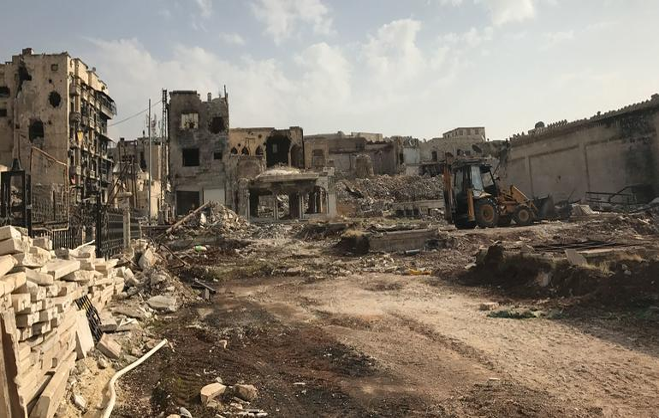By Bethany Morley / GICJ
The 30th of November 2022 marks the Day of Remembrance for all Victims of Chemical Warfare, an opportunity to pay tribute to the victims, in addition to reaffirming the need to eliminate the threat of chemical weapons.
The Organisation for the Prohibition of Chemical Weapons (OPCW) identifies a Chemical Weapon as “a chemical used to cause intentional death or harm through its toxic properties. Munitions, devices and other equipment specifically designed to weaponise toxic chemicals also fall under the definition of chemical weapons” [1], resulting in painful burns on the skin, respiratory issues due to choking agents [2] and in some cases, paralysis.

Modern use of Chemical Weapons
The prevalence of the use of chemical weapons began during the First World War. Since then, more than a million casualties have been caused globally due to chemical warfare [3]. In Syria, ongoing allegations of chemical weapons attacks have been made.
In 2012, the Syrian government confirmed their possession of chemical weapons. On the 21st of August 2013, during the Civil War in Syria, the Assad regime deployed a nerve agent in the Ghouta district of Damascus, where reportedly over 14,400 civilians fell victim to the attacks.
In 2015, the OPCW issued a Fact-Finding Mission (FFM) to investigate further incidents of the alleged use of toxic chemicals in Syria [4]. The FFM found that in September 2015 the “town of Marea was subject to shelling with both conventional munitions as well as projectiles filled with chemicals”.
On the 4th of April 2017, the civilians of Khan Sheikhoun, in the Maarrat al-Nu'man district of Syria, experienced a chemical attack with a nerve agent. This killed at least 90 people, 30 of whom were children, and injured hundreds more.
Legislation against chemical warfare
Following the First World War, the Geneva Protocol was signed in 1925 [5], prohibiting the use of chemical weapons in warfare. However, this legislation did not prohibit the development, production, or stockpiling of chemical weapons, furthering their use during World War II, the Cold War, and other cases such as in Syria and Iraq.
Subsequently, in September 1992, the Chemical Weapon Convention (CWC) was adopted and entered into force in April 1997 [6]. The Convention aims to eliminate the category of weapons of mass destruction by prohibiting the development, production, stockpiling, and use of chemical weapons and their destruction [7].
The OPCW was formally established to ensure the implementation of the CWC and works with the member states of the UN in promoting the goal of peace, security, and multilateralism through the elimination of the threat of chemical weapons. Due to the work of the OPCW, “Over 99% of all declared chemical weapon stockpiles have been destroyed under OPCW verification” [8]. Through the effective frameworks of the CWC and OPCW, they have influenced 189 nations, representing 98% of the global population, to ratify the Convention. However, chemical warfare unfortunately remains a tactic that is deployed, undocumented, and undeclared. The Syrian government is being urged by the OPCW to address gaps, inconsistencies, and unresolved discrepancies [9] in accordance with CWC that the country ratified in 2013.
The use of chemical weapons seriously violates international law. States that violate international law need to be pressured and correctly sanctioned. Therefore, the mobilisation of international communities and actors is critical to the prevention of future use of chemical warfare.
Geneva International Centre for Justice (GICJ) stands in solidarity with all victims of chemical warfare.
Chemical warfare has long-lasting psychological and health-related effects on victims and civilians. GICJ continues to condemn the use of chemical warfare and emphasises the immense violations of human rights that victims experience.
We call on all states who have not yet declared chemical weapon stockpiles to do so in order to have them safely destroyed under OPCW verification. Further, we call on these states to recognise the damage these weapons cause.
In remembering the victims of chemical warfare, GICJ calls for the international community’s cooperation in ensuring that all states effectively implement CWC and ratify legislation in relation to the prevention of the use of chemical weapons. Further, we call on the international community to continue to pressure those countries with disparities and inconsistencies in their declaration of stockpiling chemical weapons to ratify and abide by the terms of the CWC.
International Day, Chemical Warfare, Justice, Geneva, geneva4justice, GICJ, Geneva International Centre For Justice, Day of remembrance for all victims of chemical warfare
[1] https://www.opcw.org/our-work/what-chemical-weapon
[2] https://www.un.org/disarmament/wmd/chemical/
[3] https://www.securitycouncilreport.org/atf/cf/%7B65BFCF9B-6D27-4E9C-8CD3-CF6E4FF96FF9%7D/s_res_2118.pdf
[4] https://news.un.org/en/story/2022/04/1117302 [
[5] https://www.opcw.org/chemical-weapons-convention
[6] https://www.opcw.org/media-centre/news/2022/01/opcw-issues-fact-finding-mission-report-chemical-weapons-use-allegation
[7] https://www.opcw.org/chemical-weapons-convention
[8] https://www.opcw.org/chemical-weapons-convention
[9] https://www.opcw.org/chemical-weapons-convention
Image source: https://news.un.org/en/story/2022/02/1112932
UNICEF/Ninja Charbonneau - Destroyed buildings in Aleppo city, Syria, where chemical weapons were allegedly used.









